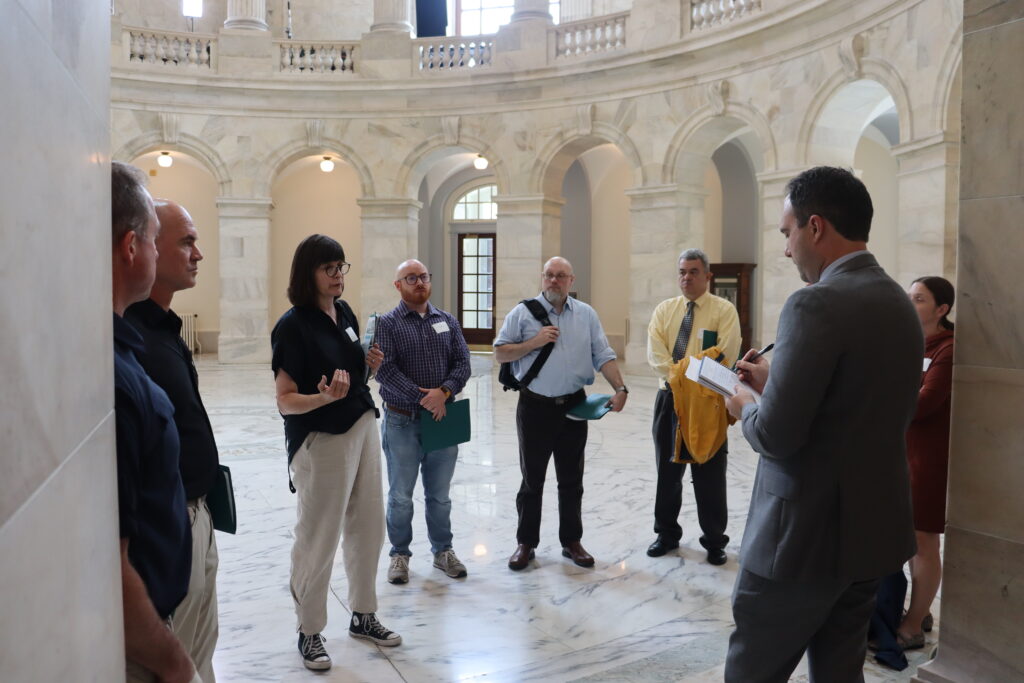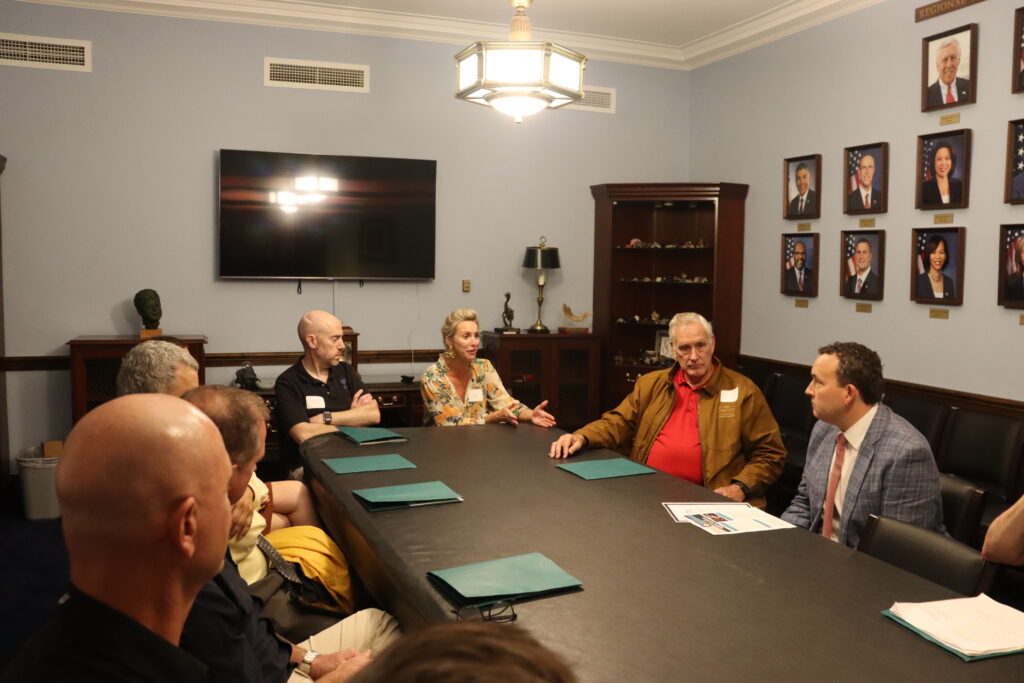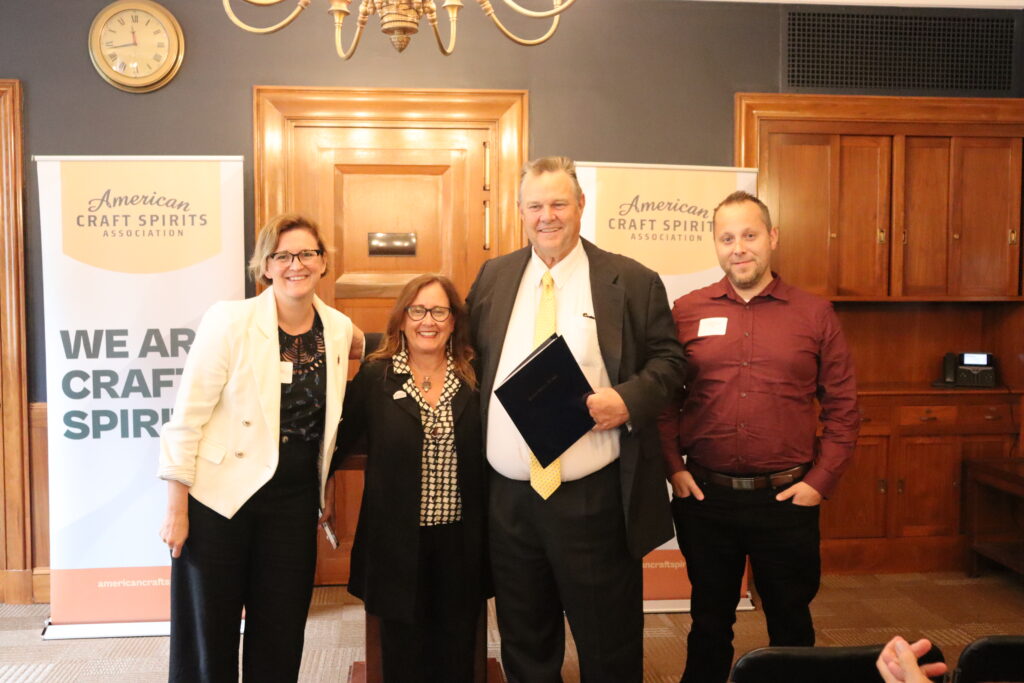At a time when a number of market headwinds are impacting small distillers’ ability to operate and thrive, more than 40 craft spirits producers from across the country headed to Washington, D.C. this week to advocate for the industry’s top federal legislative and regulatory priorities.

Craft producers met with their U.S. Senators, Representatives and regulators at the American Craft Spirits Association’s 2024 Legislative Fly-In to address a number of issues, including:
• Helping American craft distillers by ensuring regulations are not overly burdensome to small business manufacturers
• Maintaining and expanding tax incentives for America’s small craft distillers to remain competitive
• Enhancing market access by allowing spirits to be shipped through the U.S. Postal Service in states in which DtC is allowed
• Ensuring that the Alcohol and Tobacco Tax and Trade Bureau (TTB) remains open and has adequate funding to provide vital services to craft distillers
• Ensuring that the federal agencies tasked with updating the U.S. Dietary Guidelines have appropriate authority, are transparent and use clear preponderance of current scientific evidence
“We’re beyond pleased with the reception we received from the Congressional offices,” says ACSA CEO Margie A.S. Lehrman. “We remain steadfast in our desire to fight on behalf of American craft spirits. We have lots of things to change and today continues our steps forward.”

Some notable guests were on-hand to greet the group of craft spirits producers before they kicked off their Capitol Hill visits. Among those were Sen. Jon Tester (D-MT); Sen. Jeff Merkley (D-OR); William McBride, senior VP for tax and economic policy at the Tax Foundation; Andrew Desiderio, senior Congressional reporter at Punch Bowl News; and Michelle Korsmo, president and CEO of the National Restaurant Association.

But before that, on Tuesday, the group convened at TTB’s offices for a dialogue with the regulatory agency’s top officials on key issues for small spirits producers.
Tuesday evening attendees gathered at Cotton & Reed, a D.C.-based rum distillery, for the Welcome Reception and on Wednesday evening many attending distillers poured their spirits for Congressional staffers and elected officials at the Rayburn House Office Building.
The following is a more in depth view of issues that ACSA members discussed while on Capitol Hill.
Regulatory Relief for Small Business Manufacturers—The SIPS Act
TTB currently lacks the explicit authority to promulgate rules and regulations based on size to help small businesses. ACSA is urging support for pending regulatory relief for craft distillers—dubbed the SIPS (Supporting Independent Producers of Spirits) Act—which would authorize the TTB to develop rules and regulations based on a distillery’s size. The bill would also provide the opportunity for distillers to change their ownership structures, which would reduce the risks of small producers losing their federal permit and/or paying higher excise taxes. It would also require TTB to develop a single reporting form for craft distillers similar to what is required of small wineries and breweries. Additionally, the bill would finalize new standards of fill for popular RTD distilled spirits formats, including 250mL, as well as create a new 18L container. It also would create a small business advocate within TTB and orders TTB to finalize a new spirits category, “American Single Malt.”
Expanding Tax Incentives for America’s Small Craft Distillers to Remain Competitive
Distillers currently pay $2.70 per proof gallon on the first 100,000 gallons produced in a calendar year, thanks to the passage of the Craft Beverage Modernization and Tax Reform Act at the end of 2020. ACSA is calling for legislators to maintain or expand reduced excise tax rates for craft distillers producing under 100,000 proof gallons, as well as a 20% deduction for pass-through entities—as many craft distilleries are pass-through entities.
Enhancing Market Access by Allowing Spirits to be Shipped Through USPS
Current federal law prohibits spirits, as well as wine and beer, from being shipped through the USPS. Spirits must be shipped by common carriers like UPS or FedEx, which often don’t provide adequate service to addresses in rural areas. The USPS is required to deliver to all addresses in the country and, with close to 32,000 USPS centers, the Postal Service would be able to greatly ease the burden placed on small businesses. The bipartisan USPS Shipping Equity Act (HR 3721 in the House and S. 5069 in the Senate) would authorize USPS to ship alcoholic beverages. It would require beverage alcohol suppliers to register with USPS and direct USPS to establish rules so that people 21 and over and authorized agents can receive shipments. HR 3721 and S. 5069 also would prohibit the resale of alcohol beverages delivered via USPS and require entities utilizing USPS to certify that they are not violating applicable laws. The bill does not pre-empt state shipping laws and does not allow shipping into jurisdictions that do not already legally allow it. Additionally, it provides that the U.S. District Courts have jurisdiction over any claims made by state, local or Tribal governments over violations regarding sale, mailing and transportation of beverage alcohol.
Rep. Dan Newhouse introduced HR 3721 in May 2023 and Sen. Merkley and Sen. Kirsten Gillibrand (D-NY) just introduced S. 5069 on Wednesday, Sept. 18.
“All American businesses have for most of their products, the same access to the Postal Service,” Merkley told Legislative Fly-in participants. “That’s not true for spirits and that’s what we’re trying to fix. Here’s a win-win opportunity [to get] more revenue for the Postal Service.”
His home state of Oregon is a microcosm for the overall issue across the U.S.
“If you go to Portland, you see a big city; in Eugene, you’ve got a medium-sized city,” he explains. “But two-thirds [of Oregon] is on the rain shadow side of the Cascades—it’s high desert, rural. Who delivers in rural areas? It’s the Postal Service, which is required to deliver to everyone. This is an important expansion of an opportunity to reach other customers.”

Ensuring TTB has Adequate Funding to Provide Vital Services to Craft Distillers
ACSA supports full funding for the TTB—at a level of $159 million for FY 2025—to ensure that the agency can continue to provide services vital to the craft spirits industry, including timely label and formula approvals, and reduce the threat impacting the more than $20 billion received from excise taxes paid by distillers and other industries. ACSA also encourages funding received by TTB to develop regulations recognizing the challenges facing craft distillers and other small businesses gaining access to market and competing in an increasingly global marketplace.
Ensuring Federal Agencies are Transparent and Utilize Best Science to Update US Dietary Guidelines
The U.S. Departments of Health and Human Services and Agriculture (HHS and USDA) currently indicate that adults who choose to drink in moderation limit consumption to a maximum of two drinks per day for men and one drink per day for women, as it has for many years. The agencies are currently evaluating options to update the dietary guidelines scheduled to be finalized in 2025. There has been a growing concern that other HHS agencies are producing un-authorized studies on alcohol, not based on dietary science, that could impact the dietary guidelines. Members of Congress will soon be weighing in on this issue. ACSA is urging the federal government that all U.S. agencies use sound scientific research standards and conduct the necessary reviews in a transparent process using a preponderance of the evidence standard, should revisions be proposed.
Distillers who attended the Fly-in were largely optimistic after the Capitol Hill visits.
“As a distillery in Virginia, a Control State, to come to Congress with the American Craft Spirits Association and represent not only a veteran-owned but a smaller business in Virginia, it’s extremely important that we see this process early,” said Louis Shepard of Mean Spirits Distillery in Norfolk, Virginia. “Today, speaking with different representatives, both in Congress and in the Senate, gave us a stronger sense that we’re more alike than we are different in terms of the issues that we all face.”


